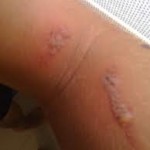Neospirin ointment is also known as Polymxyin B sulfate, bacitracin, and neomycin sulfate. This contains a mixture of anti-infectives that are used for treating specific bacterial infections, particularly skin infections. Neospirin ointment can also prevent infections that you can acquire from wounds, minor cuts, and burns.
This is a good medication if you really don’t have to take oral antibiotics to take care of the bacterial infection. The following are some facts about Neospirin ointment that you would want to discuss with your doctor:
1. How to take
 Before you apply Neospirin ointment, the first thing that you have to do is clean the affected area. Make sure that you remove the debris and the crusts. Then, apply a thin coat of Neospirin ointment two to five times in a day. You could cover the area with a sterile gauze dressing or just leave it uncovered or exposed. Avoid contact with the eyes. You should only use Neospirin ointment for seven days. If there is no development or improvement, you should call your doctor. Your dose should be computed only for you, depending on your other medication, medical conditions, and weight. You should remember not to take double doses of the medication. Keep it beyond the reach of children and pets and keep it in room temperature. Neospirin ointment should not be disposed of in wastewater. Â If you have a friend or a loved one who has the same symptoms as you are, you should not make that person use Neospirin ointment. You should have that person consult a doctor so that proper medications would be given.
Before you apply Neospirin ointment, the first thing that you have to do is clean the affected area. Make sure that you remove the debris and the crusts. Then, apply a thin coat of Neospirin ointment two to five times in a day. You could cover the area with a sterile gauze dressing or just leave it uncovered or exposed. Avoid contact with the eyes. You should only use Neospirin ointment for seven days. If there is no development or improvement, you should call your doctor. Your dose should be computed only for you, depending on your other medication, medical conditions, and weight. You should remember not to take double doses of the medication. Keep it beyond the reach of children and pets and keep it in room temperature. Neospirin ointment should not be disposed of in wastewater. Â If you have a friend or a loved one who has the same symptoms as you are, you should not make that person use Neospirin ointment. You should have that person consult a doctor so that proper medications would be given.
2. Contraindications
 Neospirin ointment should not be used by those with nerve deafness; those with infection of the eye; those who have a perforated eardrum but has an external infection of the ear; those who are allergic to aminoglycosides; and those allergic to polymyxin B sulfate, bacitracin zinc, and neomycin sulfate.
Neospirin ointment should not be used by those with nerve deafness; those with infection of the eye; those who have a perforated eardrum but has an external infection of the ear; those who are allergic to aminoglycosides; and those allergic to polymyxin B sulfate, bacitracin zinc, and neomycin sulfate.
3. Side effects
 As with any other medication, the side effects that you can have from Neospirin ointment vary from permanent, temporary, severe, or mild. You could either manage them or just wait for them to pass. Some of the mild side effects are redness, swelling, scaling, rashes, pain, and itching. You should seek medical help if you experience any of them. The more serious side effects are weakness or numbness of feet and hands, anaphylactic shock, blood in your urine, difficulty breathing, hearing loss, and difficulty urinating.
As with any other medication, the side effects that you can have from Neospirin ointment vary from permanent, temporary, severe, or mild. You could either manage them or just wait for them to pass. Some of the mild side effects are redness, swelling, scaling, rashes, pain, and itching. You should seek medical help if you experience any of them. The more serious side effects are weakness or numbness of feet and hands, anaphylactic shock, blood in your urine, difficulty breathing, hearing loss, and difficulty urinating.
4. Precautions
 If you take large amounts of Neospirin ointment, you could increase your risk of having kidney or ear damage. This is caused by the neomycin. If you have chronic swimmer’s ear, ulcers, eczema, you could develop an allergic reaction to this topical medication. Manifestation would be itchiness, swelling, redness, and scaliness. If you have a kidney malfunction, then your dose should be lowered. Prolonging the use of Neospirin ointment, can cause the overpopulation of the microorganisms because the potency is gone already. Pregnant or breastfeeding women should not take this medicine. Neospirin ointment is found in breastmilk so your child may be at risk of taking it orally if you breastfeed while applying this to your wound. The elderly’s dose should be lowered to make sure that the kidneys are safe. Children younger than 2 years old should not take this medicine yet. If you also have puncture wounds, serious burns, animal bites, and very deep wounds, you should let your healthcare practitioner first.
If you take large amounts of Neospirin ointment, you could increase your risk of having kidney or ear damage. This is caused by the neomycin. If you have chronic swimmer’s ear, ulcers, eczema, you could develop an allergic reaction to this topical medication. Manifestation would be itchiness, swelling, redness, and scaliness. If you have a kidney malfunction, then your dose should be lowered. Prolonging the use of Neospirin ointment, can cause the overpopulation of the microorganisms because the potency is gone already. Pregnant or breastfeeding women should not take this medicine. Neospirin ointment is found in breastmilk so your child may be at risk of taking it orally if you breastfeed while applying this to your wound. The elderly’s dose should be lowered to make sure that the kidneys are safe. Children younger than 2 years old should not take this medicine yet. If you also have puncture wounds, serious burns, animal bites, and very deep wounds, you should let your healthcare practitioner first.
5. Interactions
 Neospirin ointment could interact with neuromuscular blocking agents and aminoglycosides. If you are taking any of the given medications, your physician may advise you to change your medication, change the way you take the medication, stop taking the medication, or do everything the same. Taking another medication with Neospirin ointment may not mean that you have to stop taking it. Consult with your doctor about the number of interactions should be managed.  You should say any and all other medications and supplements that you are taking. Use of alcohol, smoking, and illegal drugs should be disclosed to your doctor as well.
Neospirin ointment could interact with neuromuscular blocking agents and aminoglycosides. If you are taking any of the given medications, your physician may advise you to change your medication, change the way you take the medication, stop taking the medication, or do everything the same. Taking another medication with Neospirin ointment may not mean that you have to stop taking it. Consult with your doctor about the number of interactions should be managed.  You should say any and all other medications and supplements that you are taking. Use of alcohol, smoking, and illegal drugs should be disclosed to your doctor as well.
Using Neospirin ointment should only be external. Never ingest the medication. Treat it as an individualized medication and not a general solution to all kinds of infections on the skin. Proper diagnosis should still be done. If the infection is already improving before the week is done, you should not stop applying Neospirin ointment on the affected area. Shortening the treatment will only stun the infection. Your doctor told you to apply it for a certain period to make sure that the infection is really gone.
